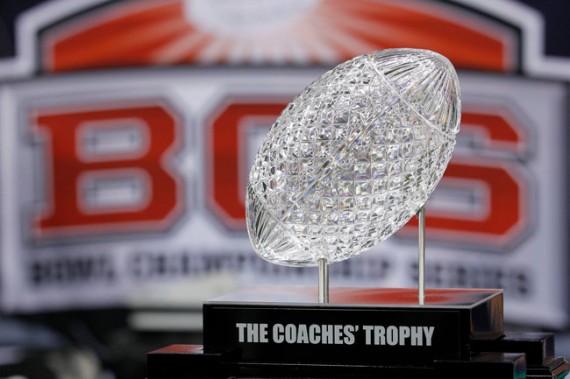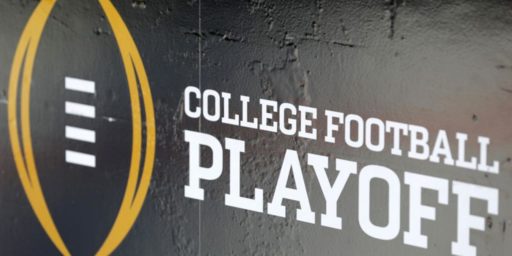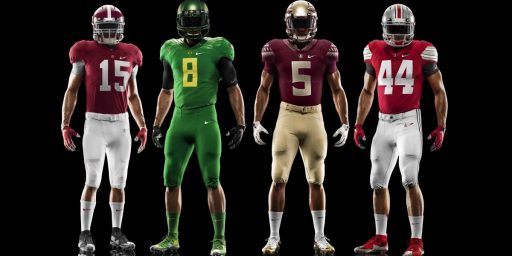Four Game College Football Playoff Approved, Will Start With 2014 Season
After years of calls for a College Football playoff, we'll finally get one. Let the criticism begin.
As previously reported, after years of complaints about the BCS system and calls for a National Championship playoff, last night University Presidents approved a plan for a four game playoff that will be followed by a National Championship Game that will rotate location much like the Super Bowl:
WASHINGTON — The university presidents stood on a stage in a hotel ballroom Tuesday, smiling and satisfied that the college football playoff system the nation had clamored for had been agreed upon in three hours.
After all the controversy surrounding the much-derided Bowl Championship Series, after the annual debates about which teams deserved to play in the national title game, a four-team playoff will be implemented in the 2014 season.
The four semifinalists will be selected by a committee, much as the field for N.C.A.A. basketball tournament is set. No conference will automatically qualify one of its teams. The two semifinal games will be rotated among six bowl sites over a 12-year period, and will be played Dec. 31 or Jan. 1. Those bowls have not been selected.
The championship game will be held at a neutral site, and cities will have the opportunity to bid to host the event. The game will be played on the first Monday in January, unless it falls on Jan. 1.
“It will be much like the Super Bowl,” said Jim Delany, the Big Ten commissioner. “You’ll be dealing with civic communities, and I think it’ll be a national process and people have to be very energetic about it. I think it’s going to be great for the sport.”
The B.C.S. Presidential Oversight Committee’s approval of the plan, which was proposed by the commissioners of the B.C.S. conferences, ended a six-month period that was filled with meetings, proposals and seemingly more questions than answers.
“Where we’ve arrived, I think, is a consensus built on compromise,” said John Swofford, the commissioner of the Atlantic Coast Conference.
The University of Nebraska president, Harvey Perlman, said he pushed for a so-called plus-one model that would have added a championship game after the completion of the bowl season.
“There were people who said there were good points,” Perlman said. “But on balance, our four-team playoff was what achieved the most consensus.”
The makeup of the playoff selection committee has not been determined. Its criteria for evaluating teams will include record, strength of schedule, head-to-head results and whether the team is its conference champion.
Swofford said he would like the committee to consist of at least 12 members, leaving leeway in case members must step aside while teams they are associated with are discussed. (The N.C.A.A. basketball tournament’s selection committee has 10 members).
Delany said he expected the committee to include more than 10 but less than 20 members, including administrators and possibly current or former coaches.
Although the playoff will be a welcome change for fans, some dissension will be inevitable. Roy Kramer, a former Southeastern Conference commissioner who was one of the architects of the B.C.S., said the focus would simply shift down a few slots.
“Now there will be controversy over which teams are Nos. 4 and 5 as opposed to 1 and 2,” Kramer said Tuesday in a telephone interview. “But this does broaden participation, and I think that’s what they were looking for.”
Indeed, such controversy would seem to be as inevitable as the criticism that developed over the BCS, which itself was developed to deal with the problems people had with what were then dueling Coach’s and Writer’s Polls that would sometimes result in two different “National Champions.” The computer-based system, taking into account different polls as well as other factors, was intended to have been an objective way to determine rankings between teams that play inherently different schedules in different leagues, and often different styles of football. It was inevitable that fans of teams that would lose out under such as system, such as recent years when Boise State was often placed far down in BCS Rankings largely on the basis of “Strength Of Schedule.” The first time that a similar situation happens to a team that is ranked at 5th or 6th, or 7th or 8th for that matter, you’re going to hear similar complaints about this new system as well.
In the end, though, I’m not sure there is such a thing as a perfect answer to this kind of “problem.” Expand this to a six team playoff and you’re going to get the same criticisms from fans of teams on the bubble. Indeed, you often do hear such criticisms after the selections for the NCAA basketball tournament, although its far less common mainly because that is a 64 team (plus play-in games) tournament. Of course, a 64 game football playoff would be unworkable and I’ve got to think that anything beyond 6 or 8 games wouldn’t work all that great either. After all, the NCAA and the conferences do have to keep in mind that, as the schedule moves in to December and January, they are going to be competing for television time with the NFL Playoffs.
I suspect that we’ll have this playoff system in place for many years before it gets changed again. After all, the BCS has been in place since 1998, although it was significantly revamped in 2004 after the controversy that resulted from the ranking of USC and the impact of the computer-based system on final standings. The tweaks that took place during this team didn’t satisfy the critics, though, so we’ll get a playoff and the BCS will be effectively dead after 14 years. So, don’t expect the four-game playoff to change significantly for many years after 2014. In any event, you’ve got your playoff people, and I guess that’s a start, no?







This doesn’t make sense. So the championship game could conceivably be held one day after a semifinal game?
This is true, but the controversy will be much smaller. There has never been four or five undefeated teams. There have been three, who absolutely deserve a shot even if their strength-of-schedule is weak. In my opinion, if you have lost at all, you gave up your right to be outraged about being excluded.
This may be worth a mention Doug — CNN/Fortune, on the eve of Issa’s contempt vote, just published the results of a six month investigation into F&F. It’s an extremely long and detailed article but likely of interest since you’ve been covering the story a lot lately:
The truth about the Fast and Furious scandal
bad day for Harvey Perlman
@Jeremy R:
Wrong thread, dude.
@Franklin: The question is what happens when an undefeated team is left out in favor of a team with a loss or two because the latter plays in a better conference than a former.
The only teams that didn’t play in one of the big five conferences that ended up in the top four are TCU and some Big East teams. However, the TCU played in a MWC that doesn’t exist anymore, and the Big East isn’t what it was. An undefeated team is likely to be passed over in favor of 1-loss or even 2-loss teams from the SEC or Big 12.
@Trumwill:
A four team playoff sets the table for four 16 team (of less) conferences to break away from the NCAA and create their own college sports league. No sharing of the money and no having to deal with other sports. The NCAA forces schools to have at least 8 sports. A 64 team team football association would drop the requirement for non-revenue sports and would consist of football, men’s basketball, and enough women’s teams for Title IX compliance.
How does a four team playoff work with five major conferences. that means every year at least one and maybe two conference champions are left out.
Also, one has to decide whether to feel sad for Boise State or feel that it is poetic justice. Boise State left the WAC for the MWC to improve their football schedule and then the MWC feel apart. Now Boise State is leaving for the Big East at the time that the Big East is falling apart.
When one realizes that less than 64 schools have a real fan following, it should be easy to see that there is only room for 64 football schools.
@Trumwill: My opinion is that that scenario won’t happen. Or at least, it shouldn’t. The conference realignments make it a bit harder to predict, but I think the new committee would have been nuts to leave out one of the undefeated teams of the past, even if the BCS ranked them 6th or whatever.
@superdestroyer: As I said the last time this came up, the BCS didn’t let the mid-majors into their bowls because they are kind and generous. They did so because the pressure was too intense for them not to. There is no reason to believe that similar pressure won’t be applied in light of a playoff. Either the bowls will retain enough relevance to keep everybody happy, or the playoff system will expand in the same way the BCS did.
@Franklin: We’ll see. I’d be surprised to see a 13-0 MAC team ever get an invitation. Well, maybe if they have a multi-year run like Marshall did (with a few fewer losses). It’d take a lot, though. If it’s not more trouble than it’s worth, maybe a Big East, C*USA, or MWC gets in. The BE is possible, the other two are real long-shots. The MAC and SBC… I just can’t see it happening except after five seasons of Boise-like performance. Maybe even then.
@Trumwill:
A four team playoff does not fit a five major conference structure with five conference championship games. There is always one team on the outisde and if there is an upset in the championship games, then there is two conference champions on the outside.
If Notre Dame ever recovers, there could be a situation of two SEC schoosl, Notre Dame, and one other school. That leaves three major football conference champions on the outside, playing in unwatched, low attendence bowl games (if the bowl games survive).
Any conference that does not get a team into the playoff for three or more years in a row is a conference that will not survive.
The only way a four team playoff works (which is a 12 year plan) is for four 16 team conferences. The biggest hold up for four conferences is that no one will want Texas in their conference and Notre Dame does not play nice with others.
@superdestroyer:
None of that addresses the fact that the non-premier conferences have enough political clout to prevent being shut out entirely. That’s how they made inroads to the BCS.
Conferences that don’t get teams into the playoff will survive, in large part because some number of their schools will have nowhere to go.
It’s worth that the overall plan still very much has a place for the bowls, and not just the semi-final ones. That is, I think, how they’re going to try to pacify the lower conferences and keep the pressure off. “Maybe you can’t make the playoffs, but you can play in the Sugar Bowl if you go undefeated.”
Will that work? I’m not sure. If it doesn’t, that’s not going to result in 60+ schools packing up their tents and going home; it’s going to result in an 8, 10, or 12 team playoff.